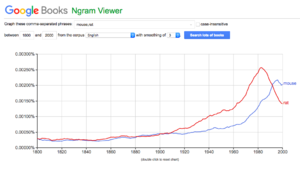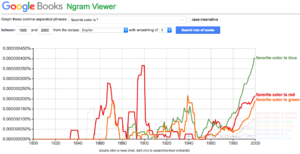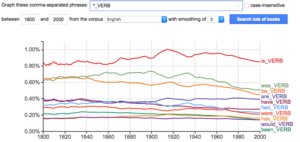Course:COGS200/2017W1/NGramAssignment/AlyssaGutierrez
- codes for each section are in the pictures attached**
Comparing words
Looking up the words "rat" and "mouse", the viewer showed that there was a point in which the usage of these words were almost the same in the mid-1990s, perhaps due to an increase in scientific literature involving both rats and mice. During the late 1990s, however, there is a there is a decrease in usage of "rat" as opposed to "mouse", which may be because the latter was much more convenient to use in laboratory experiments.
"'Wildcard search'"
We typed in the phrase "favourite colour is *" and that in English written text, the top three colours were blue, green, and red, which may be caused by the ""trichromatic colour theory"". This explains that these three colours are the basis of other colours.
"'Inflection search'"
For this one, we searched the phrase "the cow jump", and the graph showed different relations for variations of the phrase: - "the cow jumped" - "the cow jumping" - "the cow jump" - "the cow jumps" We found that the phrase "the cow jumped" was the most common phrase out of all of them. Maybe this was because it was the only complete, meaningful phrase among the others, or some historical/cultural reference ("The cow jumped over the moon")
"'Search for a word using Part-of-Speech tags'"
The verb "lead" has always been more common compared to the noun and adjective versions of the latter, as shown in the graph. Towards the 2000s, the usage of lead_VERB has increased, perhaps due to the increase in entrepreneurial spirit. In contrast, lead_NOUN usage has decreased towards the 2000s - maybe due to an increased awareness of its hazards and risks.
"'Search for Parts of Speech (not a specific word)'"
The verb "is" has always been the most commonly used verb, which was a bit surprising, as we had thought "are" and "was" would have been used almost as regularly (which was not the case at all, as shown by the graph). There may be various reasons for this, whether it be culturally or because of its predominance in literature. For example, since literature is mainly character-driven, "is" would be used more regularly.




